How Seniors and Millennials Date
A New Comparative Study on Dating Habits
February 2023
Do older adults use dating apps as often as millennials? Are millennial men less likely to be chivalrous than their older counterparts? Are single adults more or less promiscuous when they’re dating in their senior years?
We surveyed 829 adults who are either millennials (ages 22 to 34) or older adults (ages 55 and up). We asked them everything from how they meet people to what time they go to bed after a date (and what happens once they get there).
We also talked to dating coaches, relationship experts, bloggers, matchmakers and more to see what they had to say about our findings.
Some of what we found may surprise you and might change what you thought you knew about dating and getting older.
Key results:
- 29% of seniors have gone on a date with someone they met on an online dating service in the last 12 months.
- 17% of men over 55 “always” or “very often” buy gifts for dates compared to 25% of men ages 22-34.
- Older adults are 29% less likely than millennials to say that looks are “extremely important” in a potential dating partner.
- Men over 55 are 83% more likely than women over 55 to say that age is not at all important in a dating partner.
- Millennials are 32% more likely than older adults to become physically intimate on a first date.
Seniors Have Embraced Online Dating
Any conversation about dating in the 21st century should begin with a look at online dating. The Internet, and more specifically dating websites, have dramatically changed the game for singles.
But it’s not just millennials who have benefited from dating apps. We found that older adults have embraced online dating almost as much as their children’s and grandchildren’s generations.
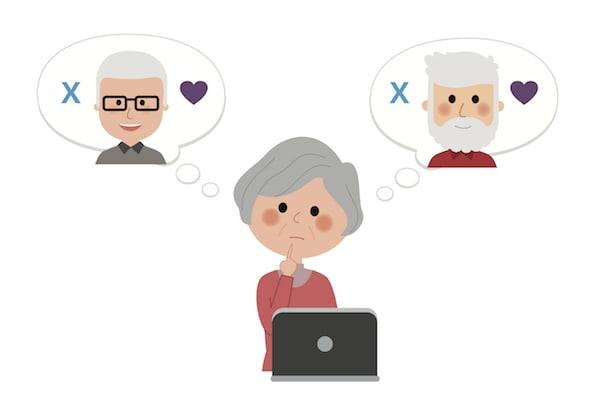
“The Internet opened up dating for seniors. It created dating for seniors actually,” said Ken Solin, author of The Boomer Guide to Finding True Love Online.
Our survey results support Solin’s assertion. A total of 29% of seniors reported going on a date with someone in the last year that they met through a dating website, which was not significantly lower than the 45% of millennials who said the same.
When the two groups were asked how they most often find a date, 35% of seniors cited dating websites or apps while 52% of millennials reported the same. Given that 98% of Americans under the age of 29 use the Internet, compared to 87% of those over the age of 50, the rate of online dating between the demographics is relatively consistent with their respective Internet usage.1
“Senior singles in America make up one of the fastest growing demographics in online dating. For most seniors, online dating is a brand new experience. For many of them, it didn’t even exist when they were last single.” - Scott Valdez, founder of VirtualDatingAssistants.com
Further, only 26% of older adults reported having never used an online dating service, compared to 23% of millennials.
“When you’re an older adult, meeting someone isn’t always easy. You often have a significantly smaller social network than your average millennial, so there’s limited opportunities to meet other seniors who are also interested in dating,” said Scott Valdez, founder of the matchmaking website VirtualDatingAssistants.com. “Dating sites are the perfect solution to that problem.”
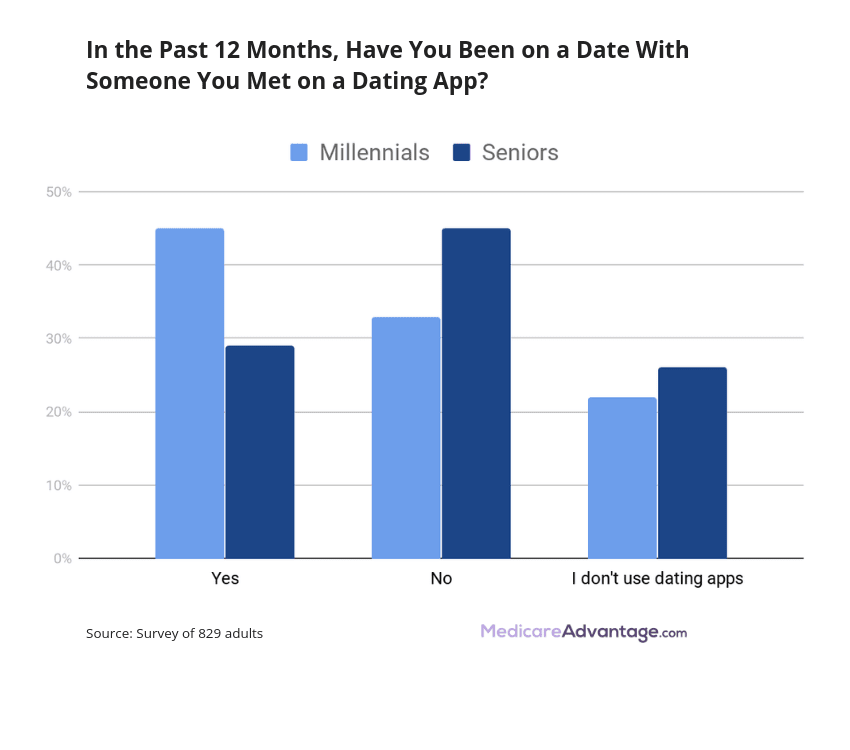
But what’s holding single seniors back from fully embracing the online dating world? The experts we interviewed proposed more than one theory.
“For some, it might seem like a crass, cheap, or even frightening way to meet a partner since intimacy and the machine might feel perfectly opposite,” said Deborah Cohan, professor of sociology at the University of South Carolina and contributor to Psychology Today. “Some seniors may assume, and for good reason, that the online format will be too alienating or that it will be impossible to convey an authentic and multidimensional sense of self.”
In other words, older adults may hold some reservations about the authenticity of meeting someone online. And that skepticism can extend further to include apprehensions about safety.
“Some seniors are more prone to falling for a scam, and there are many who prey on them just for that reason. Older women especially fall victim to Internet dating scams,” noted blogger and relationship expert J. Hope Suis.
“Overall, seniors have had more life experience with, and appreciation for, the sacred quality of face to face interactions and what is lost when more and more replaces that.” – Deborah Cohan, University of South Carolina
And although older adults are using smartphones, social media and the Internet in increasing numbers, there are still some who remain on the technological sidelines.
“Younger seniors who might be more used to using technology because of their jobs or their own curiosity may not have a problem with this, but for older seniors, sometimes the first thing to conquer is the technology itself,” said Cohan. “One needs to own a computer or have very ready access to it, or have an iPad or smartphone and have some proficiency with the Internet, the ability to set up a compelling profile, etc.”
The Internet has no doubt changed the game for single seniors. But what else is different about dating for older adults in the 21st century?
Seniors Meet Dates the “Old Fashioned Way”
Despite embracing online dating, older adults are still meeting people the “old fashioned way” at a higher rate than millennials.
When asked where they typically meet a person who they end up going on a date with, 22% of seniors responded “out and about in public.” Only 13% of millennials stated they meet dates the same way.
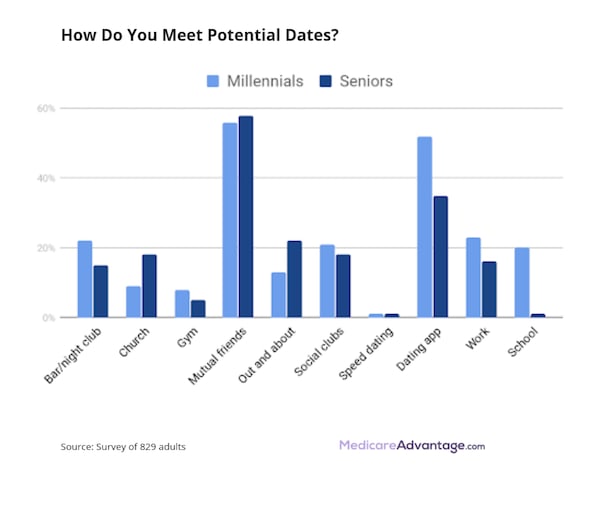
Furthermore, 18% of seniors said they typically meet someone at church, while only 9% of millennials said they meet a potential date at church.
“For most seniors, having success with modern dating means learning a brand new skill set: Describing yourself online, posting pictures on your profiles, exchanging messages with a complete stranger — and doing it all in an attractive way.” – Scott Valdez
Older adults were also found to be fairly similar to millennials in other more traditional ways of meeting people. According to our survey:
- 15% of seniors and 22% of millennials meet at a bar or nightclub
- 6% of seniors and 8% of millennials meet at the gym
- 18% of seniors and 21% of millennials meet through a social club, activity or hobby
- 58% of seniors and 59% of millennials meet through mutual friends
Chivalry Isn’t Dead, It’s Getting Younger
Somewhat surprisingly, more millennial men (25%) said they “always” or “very often” bring a gift to a first date, such as flowers or chocolates, while only 17% of senior men said the same.
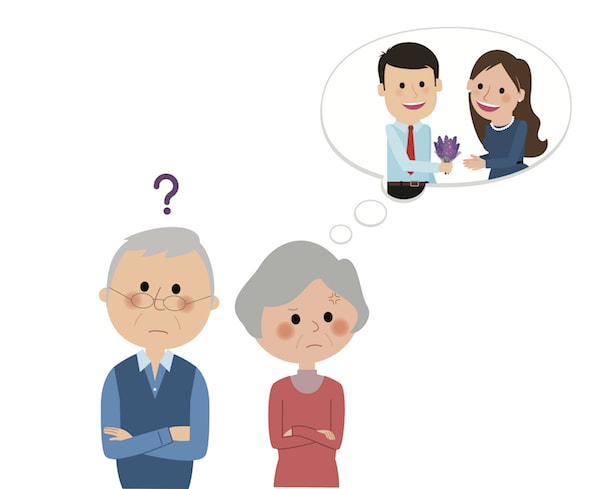
Could it be that millennials are more materialistic? Are older men more frugal with their money? The experts we spoke to offered a range of possible explanations.
“It could simply be an economic issue where some seniors are on a fixed income and can’t splurge, or it could be a mindset that those things are not nearly as important as compatibility and enjoying each other’s company,” said Suis.“ I think the older we get, the less concerned we are about material things and long for deeper connections.”
Heather Ebert, a dating and relationship expert and spokesperson for the dating site WhatsYourPrice.com, suggests it could be purely a generational trend.
“Back in the day, it was a man’s job to be a provider, while women were concerned with romance and taking care of family and home,” Ebert said. “We don’t see these same gender roles as much today, and that has a lot to do with how relationships have evolved. In addition, millennials in general tend to put more emphasis on small gestures, like buying flowers, even if they cost a few dollars.”
Age Isn’t Just a Number to Senior Women
Our survey found that age is more than just a number to older women. Senior men were 83% more likely than senior women to say that the age of a dating partner was “not at all important.” But the experts we interviewed were quick to point out that the disparity is likely due more to gender than generation.
“I think men of all ages typically do not put as much thought into the age of their partners as women do,” Suis said. “When it comes to senior men, they of course would never object to a younger woman, but even an older woman does not bother them if there is a connection.”
For women, however, a difference in age may negatively affect their confidence.
“Some older women look at it from a different perspective,” Suis continued. “Dating someone much younger puts them in direct competition with younger women, and even though self-esteem shouldn’t play a part, it does. She will often doubt his attraction to her, or her ability to sustain that attraction as she will obviously continue to age.”
A recent study published in Science Magazine found that the desirability of a woman peaks at age 18 and declines with each year thereafter.2 Meanwhile, the desirability of a man rises with age until hitting a peak at age 50, before beginning to decline.
In other words, a younger woman is more likely to be attracted to an older man than a younger man is to be attracted to an older woman.
“Men of all ages want a youthful and vibrant woman, whereas women search for qualities like financial security, kindness and maturity. The difference is that for a woman to be youthful and vibrant to a man, she’s going to be younger than him, but a woman can easily find a man her age that possesses the traits she desires.” – Heather Ebert, dating and relationship expert
According to the dating experts we spoke to, there’s another reason why women may place more emphasis on their partner’s age.
“Since women are still saddled with the lion's share of caregiving in relationships and families, most very healthy and strong older women may be concerned about additional years of caregiving with a new partner and would want more evidence that a man is physically incredibly capable,” said Cohan.
Suis explained further, saying that “In dating an older guy, (a woman) will worry about becoming a caretaker. Women tend to outlive men, and in their declining days, men rely on the women in their lives to take care of them. It’s one thing if you have been with someone for decades, and you of course are committed to your loved one, but dating someone for a few months and (then being) placed in that position is a little more daunting and discouraging.”
Seniors Prefer Direct Communication When It Comes to Dating
Just as older adults prefer face-to-face interaction in their approach to finding a date, they are just as direct when it comes to setting up plans for a date.
Millennials were found to make plans for a date via text message more than 54% of the time, compared to just 19% of the time for older adults.
Meanwhile, nearly 70% of seniors preferred to set up a date either over the phone or face-to-face, compared to just 39% of millennials.
"I’m a dating coach and I help mostly women over 55 (or) 60, and they all say the same thing: ‘I don’t want a guy to ask me out in a text.’ Seniors like it more direct." – Ken Solin
The experts we spoke with provided both social and technological reasons to explain the disparity.
“I think technology has somehow socially crippled millennials, because they find it easier to communicate by text than an actual phone conversation,” Suis said. “I think older individuals are literally ‘old-school’ and prefer to actually hear someone’s voice. They like the personal connection. They typically live a slower paced life and enjoy taking the time to interact in this manner.”
“Millenials — and even their parents — have learned how to have meaningful conversations through text,” said Ebert. “Older people may not understand how to convey personality or set clear plans via text messages, whereas younger people are extremely skilled at it, so it’s easy to plan for a date that way.”
Millennials are using technology to communicate more not just in their dating lives, but in their professional and everyday lives as well. Companies like JPMorgan and Coca-Cola are foregoing voicemail services for many of their younger employees because they simply aren’t communicating with clients over the phone.3
“Millennials on are the leading edge of a new era of communication. Digital communication – be it texting, emailing, or messaging through social media – is the new normal,” said Valdez.
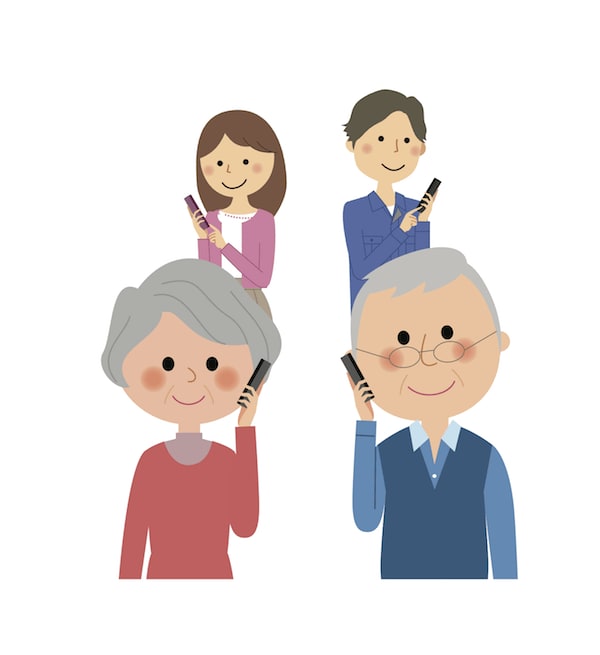
While millennials may be ushering in a new era of communication — and a new era of dating, for that matter — many older adults still long for something more tried and true.
“They still want the old-fashioned dating experience,” said Stef Safran, founder of the Chicago-based matchmaking service Stef and the City. “They want to go with someone to dinner, maybe a movie, whereas millennials will do group dates, they’ll do hookups.”
“For senior singles, picking up the phone is still second nature. It’s also a ‘comfort step,’ as seniors in general tend to be a bit more wary than millenials about meeting a total stranger in person,” said Valdez. “A phone conversation allows older daters to get to know each other better and make sure there’s a potential connection before meeting face to face.”
Seniors Long For a Deeper Connection
So what are older adults looking for in a date, and how does it differ from their younger counterparts?
The data suggests that seniors are looking for connections on a deeper level than millennials.
For starters, millennials were 29% more likely than seniors to say that physical looks were “extremely important” in a partner. And millennials were 67% more likely to say that sharing common interests with a dating partner was not at all important.
59% of older adults said shared religious or political beliefs were either “very” or “extremely” important, compared to only 49% of millennials who said the same.
“(Millennials) are not quite as set in their ‘ways’ and are more likely to experiment with those who may have different views or lifestyle choices than their own,” Suis said.
“(Seniors) have a lot more parameters,” said Solin. “They have good ideas in mind of what’s going to work for them and what isn’t. They’ve dated enough, they’ve been married, they’ve been in relationships, they know what they’re looking for. I think they’re very focused on who they’re willing to spend time with.”
This sentiment is echoed by the respective percentages of each age group who say they become physically intimate on a first date. 57% of older adults say they do not become physically intimate off the bat, and only 43% say that they have.
For millennials, the ratio is reversed: 57% say that they have been physically intimate on a first date, compared to 43% of millennials who say that they have not.
In fact, only 54% of millennials say they “never” or “rarely” become physically intimate on a first date, compared to 73% of older adults.
Conclusions
So what did we learn? Older singles are putting themselves out there in a number of both traditional and modern ways. Not only are many older adults looking for a lasting partner, but they’re learning a whole new way of going about their search. And many of their core values still remain. Seniors are embracing new ways of communicating and connecting, while not losing sight of what they know about love and life through years of experience.
“For most seniors, it’s not their first rodeo,” Valdez said. “They’re not looking to play games or entertain themselves. They genuinely want to meet someone new and spend time with them.”
Methodology
The study was conducted in August 2018 using an online survey, via Amazon’s Mechanical Turk, of 1,239 participants (N=1,239). Participants who self-identified as a healthcare professional or who had “Never” visited a doctor were not included in the final sample. Participants ranged from ages 18-77.
- Age distribution: Men: 49%; Women: 51% (Census Matched)
- Margin of Error: +/- 2.70 %
This survey relies on self-reported data. Gender data was evaluated for self-consistency against previously provided responses; inconsistent respondents were excluded from the sample.
Fair use statement
Of course we would love for you to share our work with others. We just ask that if you do, please grant us the proper citation so that we may be given credit for our efforts.
Research and reports
Our research reports analyze a number of issues important to seniors, from health perceptions, medical communication, health habits, and more.
Acknowledgements
- Hope Suis, blogger and relationship expert, HopeBoulevard.com
- Heather Ebert, dating and relationship expert, WhatsYourPrice.com
- Deborah Cohan, Professor of Sociology, University of South Carolina
- Scott Valdez, founder of VirtualDatingAssistants.com
- Ken Solin, author, columnist and speaker, KenSolin.com
- Stef Safran, founder of StefAndTheCity.com
